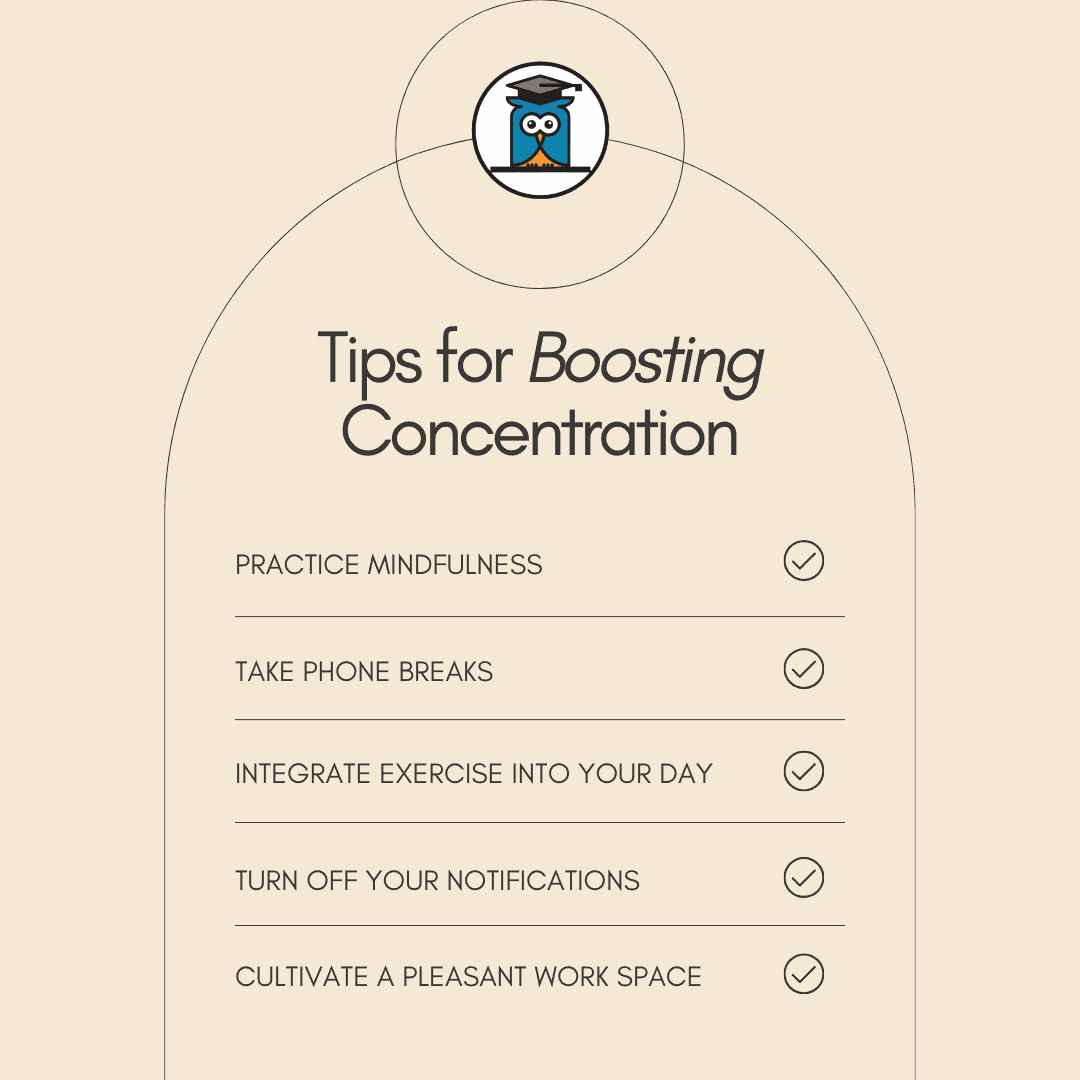In today’s fast-paced and often overstimulated world, maintaining focus and attention can be a challenging task for everyone. With an endless stream of information and notifications from social media and the internet, it’s no wonder our attention spans are dwindling.
As education inches further and further into the digital space, how can students be expected to ignore all the pings and texts that come from their phones, iPads, and laptops, whilst still using apps and sites for school?
Fear not! There are several strategies students can employ to improve their attention spans and enhance their overall learning experience. In this article, we’ll explore ten effective techniques that students can use to boost their concentration and focus.
The first five strategies are immediate practices that students can implement daily. The latter five are longer-term habits that, with repeated practice, can assist with building attention span in the long run.
1. Practice mindful meditation or breathing exercises
Mindful meditation has gained significant popularity in recent years due to its numerous benefits for mental well-being. Mindfulness can help students develop greater awareness of their thoughts and emotions, enhancing their ability to focus on the present moment by reducing stress and anxiety (two common barriers to maintaining attention).
By taking just a few minutes each day—whether at the start or end of the day—to sit quietly and observe their breath or sensations in their body, students can strengthen their attention muscles and cultivate a calmer, more focused mind.
If meditation feels too foreign or unapproachable, students can also practice deep breathing exercises. Diaphragmatic breathing or box breathing help activate the body’s relaxation response and promote feelings of calmness and focus.
2. Break things into manageable chunks
Whether breaking down specific projects or an infinite to-do list, separating larger tasks into smaller, more manageable chunks can prevent students from feeling overwhelmed.
One way you can do this is by creating a small list of tasks or goals for each study session, and prioritizing them based on importance. As tempting as it may be to stack on the items, try to limit, say, each hour, to one to two tasks.
Another way you can practice chunking is through the Pomodoro Technique, a time management method that involves breaking down work into timed intervals, usually 25 minutes, with short breaks in between. This technique can be particularly beneficial for students who struggle with maintaining focus for extended periods.
Chunking also helps with learning and absorbing information, as it can reduce cognitive load and improve comprehension. Organize course material into meaningful chunks or categories, which will make it easier for you to process and retain. For example, when studying a complex topic, break it down into key concepts or themes.
If your main form of motivation is getting a good grade or receiving praise, try thinking about long-term goals related to your academic journey and personal development.
Try using a rewards system
Additionally, establish a system of rewards to reinforce positive behavior and encourage sustained effort. Rewards can be as simple as taking a short break, enjoying a favorite snack, or engaging in a pleasurable activity after completing a task or reaching a milestone. By setting goals and rewarding progress, students can stay motivated and maintain attention throughout their academic journey.
3. Limit distractions (with a caveat!)
One of the most effective ways to improve attention span is to minimize external distractions. Try turning off notifications, finding a quiet space to work, and using tools like website blockers.
However, some students find that background music or ambient noise can help improve their concentration and focus. Experiment with different types of music or white noise to find what works best for you. For example, instrumental music or nature sounds may help drown out distractions and create a conducive study environment. However, it’s essential to strike a balance and ensure that the music or noise level is not too loud or distracting, as that can interfere with concentration.
4. Utilize visual aids and mnemonics
If you’re more of a visual learner, visual aids such as diagrams, charts, and graphs, can help you better visualize complex concepts and encode information. Additionally, mnemonics, memory aids or other techniques that help facilitate recall can be particularly useful for enhancing attention and retention.
5. Employ the ‘five more’ rule
The “five more” rule is a simple technique that can help you extend your attention span and push through moments of distraction or fatigue. Commit to focusing on a task or activity for just five more minutes whenever you feel your attention waning. By breaking down the remaining time into smaller increments and focusing on short bursts of effort, you can build momentum and gradually increase your ability to sustain attention over longer periods.
6. Practice active listening and learning in the classroom
Sometimes, studying starts at school, long before you set your backpack down at home.
Active listening is a skill that involves fully concentrating on what is being said, processing the information, and responding thoughtfully. You can practice active listening during lectures, class discussions, and group study sessions by taking notes, asking questions, and actively engaging with the material. This not only improves your comprehension of the material, but also helps you improve your concentration.
Active learning involves learning through activities that require participation, problem solving, and critical thinking. While studying alone can benefit your concentration efforts, don’t be afraid to grab a friend or two and engage in group discussions, peer teaching, hands-on experiments, or interactive exercises.
Active learning promotes deeper understanding, enhances retention, and stimulates cognitive engagement, thereby improving attention span and learning outcomes.
7. Practice memory techniques
Memory techniques, such as visualization, association, and repetition, can help students retain information more effectively and improve their attention span.
Encourage students to explore different memory strategies, such as creating mind maps, using mnemonic devices, or employing spaced-repetition techniques. By actively engaging with the material and employing memory-enhancing strategies, students can strengthen their cognitive abilities and enhance their attention and retain more information.
8. Incorporate variety into study sessions
If we’re being honest, sometimes the subjects we have to study can be really, really boring. Combine a boring subject with a boring study routine, and you’re guaranteed to be in for a snooze fest. Since monotony can lead to boredom and a decreasing attention span, try to incorporate variety into your study sessions by alternating between different subjects, study methods, or learning activities. For example, switch between reading, writing, practicing problems, or watching educational videos. Variety keeps the brain engaged and prevents fatigue, allowing you to maintain focus for longer periods.
9. Practice digital detox
Excessive screen time and constant exposure to digital devices can impair your attention span and cognitive function. Take regular breaks from your electronic devices by establishing screen-free zones or designating periods of time each day for unplugging . Activities such as reading, spending time in nature, or engaging in creative hobbies can promote relaxation and mental clarity.
10. Develop metacognitive skills
Every learner is unique in their ability to process and articulate information. This is why metacognition can be so important.
Metacognition is the ability to monitor and regulate one’s own thinking processes. You can develop metacognitive skills by reflecting on your learning strategies, identifying areas of strength and weakness, and adjusting your approach accordingly. Ask yourself some of the following questions:
- Am I understanding this material?
- What strategies can I use to improve my focus?
- What learning strategies work, and which don’t?
By becoming more aware of your own cognitive processes and learning habits, you can better self-regulate your learning and build a toolkit of strategies that work best for you.
Final thoughts
In conclusion, improving attention span is a skill that students can develop with practice and dedication.
Still, if you continue to struggle with maintaining attention, don’t be afraid to seek support from a teacher, tutor, counselor, or mental health professional. These professionals can provide personalized guidance and support tailored to your individual needs and help address any underlying issues contributing to attention difficulties.
By incorporating these ten effective strategies into their daily routines, students can enhance their ability to concentrate, stay focused, and ultimately, achieve academic success. Remember, consistency and patience are key, and small changes can lead to significant improvements over time.







